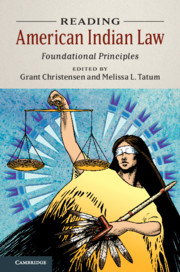Book contents
- Reading American Indian Law
- Reading American Indian Law
- Copyright page
- Dedication
- Contents
- Editors and Contributors
- Preface
- Acknowledgments
- Introduction
- Part I Core Concepts
- Part II Voices
- 5 “Life Comes from It”: Navajo Justice Concepts
- 6 Tribal Court Praxis: One Year in the Life of Twenty Indian Tribal Courts
- 7 Beyond Indian Law: The Rehnquist Court’s Pursuit of States’ Rights, Color-Blind Justice, and Mainstream Values
- 8 A Narrative of Sovereignty: Illuminating the Paradox of the Domestic Dependent Nation
- Part III Property
- Part IV (Mis)Understandings
- Book part
- References
7 - Beyond Indian Law: The Rehnquist Court’s Pursuit of States’ Rights, Color-Blind Justice, and Mainstream Values
from Part II - Voices
Published online by Cambridge University Press: 11 December 2019
- Reading American Indian Law
- Reading American Indian Law
- Copyright page
- Dedication
- Contents
- Editors and Contributors
- Preface
- Acknowledgments
- Introduction
- Part I Core Concepts
- Part II Voices
- 5 “Life Comes from It”: Navajo Justice Concepts
- 6 Tribal Court Praxis: One Year in the Life of Twenty Indian Tribal Courts
- 7 Beyond Indian Law: The Rehnquist Court’s Pursuit of States’ Rights, Color-Blind Justice, and Mainstream Values
- 8 A Narrative of Sovereignty: Illuminating the Paradox of the Domestic Dependent Nation
- Part III Property
- Part IV (Mis)Understandings
- Book part
- References
Summary
Beyond Indian Law: documents the Rehnquist Court’s shift away from jurisprudence that permitted a sovereign people to control their own territory, and the people within it, and toward a ‘subjectivist approach’ that allows the Supreme Court to determine what Indian law ought to be. It places this shift within a broader narrative of the Court deviating from well-established interpretive principles. Getches ultimately critiques the signals the Rehnquist Court has sent in its existing jurisprudence and warns that future cases will see state interests prevail in their control of the reservation, attempts to protect Indians as sovereigns will fail, and that mainstream values will be protected.
- Type
- Chapter
- Information
- Reading American Indian LawFoundational Principles, pp. 164 - 187Publisher: Cambridge University PressPrint publication year: 2019

